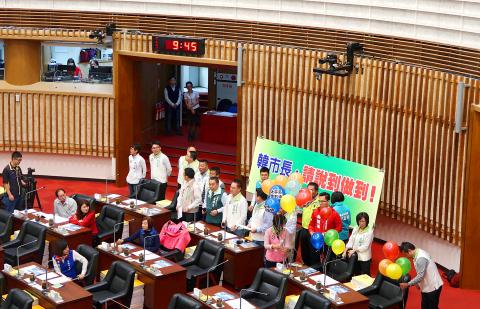Kaohsiung Mayor Han Kuo-yu (韓國瑜) yesterday faced intense scrutiny in his first city council meeting, as opposition councilors questioned him over his campaign promises, which they said were unrealistic and unworkable.
The Democratic Progressive Party (DPP) caucus listed Han’s 12 key campaign promises and asked him how many of them he could deliver in the coming four years.
The mayor said he should be able to fulfill one of them — road improvement — adding that the 12 pledges comprise short, medium and long-term goals.

Photo: CNA
Aside from road improvement, Han’s other promises include turning Kaohsiung into the richest city in the nation, developing the city’s “love industry,” increasing the city’s population to 5 million, setting up a casino, building shared residences for young and older people, and opening the city’s real-estate market to Chinese investment.
Asked how he plans to boost Kaohsiung’s population to 5 million, Han did not give a direct answer, but said “not to sell oneself short.”
He added that he has been working hard to get the US’ Walt Disney Parks and Resorts to build a theme park in Kaohsiung and talking to people on organizing major auto racing events.
Unsatisfied with Han’s remarks, DPP councilors accused the mayor of using Kaohsiung as a laboratory for his experiments.
DPP City Councilor Chen Chih-chung (陳致中), the son of former president Chen Shui-bian (陳水扁), asked Han if he still supported the so-called “1992 consensus” after Chinese President Xi Jingping’s (習近平) speech earlier this month on Beijing’s “one China” principle and “one country, two systems” framework.
The “1992 consensus” — a term former Mainland Affairs Council chairman Su Chi (蘇起) in 2006 admitted making up — refers to a tacit understanding between the Chinese Nationalist Party (KMT) and the Chinese Communist Party that both sides acknowledge there is “one China,” with each side having its own interpretation of what “China” means.
Han said that the “1992 consensus” is not the same as the “one country, two systems” framework.
DPP City Councilor Chen Ming-tse (陳明澤) questioned Han on his campaign platform of “economy 100 percent and politics 0 percent” — a promise to focus on the economy and to set politics aside.
By accepting the “1992 consensus,” the mayor has given politics “300 percent,” Chen Ming-tse said.

The manufacture of the remaining 28 M1A2T Abrams tanks Taiwan purchased from the US has recently been completed, and they are expected to be delivered within the next one to two months, a source said yesterday. The Ministry of National Defense is arranging cargo ships to transport the tanks to Taiwan as soon as possible, said the source, who is familiar with the matter. The estimated arrival time ranges from late this month to early next month, the source said. The 28 Abrams tanks make up the third and final batch of a total of 108 tanks, valued at about NT$40.5 billion

Travel agencies in Taiwan are working to secure alternative flights for travelers bound for New Zealand for the Lunar New Year holiday, as Air New Zealand workers are set to strike next week. The airline said that it has confirmed that the planned industrial action by its international wide-body cabin crew would go ahead on Thursday and Friday next week. While the Auckland-based carrier pledged to take reasonable measures to mitigate the impact of the workers’ strike, an Air New Zealand flight arriving at Taipei from Auckland on Thursday and another flight departing from Taipei for Auckland on Saturday would have to

A group from the Taiwanese Designers in Australia association yesterday represented Taiwan at the Midsumma Pride March in Melbourne. The march, held in the St. Kilda suburb, is the city’s largest LGBTQIA+ parade and the flagship event of the annual Midsumma Festival. It attracted more than 45,000 spectators who supported the 400 groups and 10,000 marchers that participated this year, the association said. Taiwanese Designers said they organized a team to march for Taiwan this year, joining politicians, government agencies, professionals and community organizations in showing support for LGBTQIA+ people and diverse communities. As the first country in Asia to legalize same-sex

MOTIVES QUESTIONED The PLA considers Xi’s policies toward Taiwan to be driven by personal considerations rather than military assessment, the Epoch Times reports Chinese President Xi Jinping’s (習近平) latest purge of the Chinese People’s Liberation Army (PLA) leadership might have been prompted by the military’s opposition to plans of invading Taiwan, the Epoch Times said. The Chinese military opposes waging war against Taiwan by a large consensus, putting it at odds with Xi’s vision, the Falun Gong-affiliated daily said in a report on Thursday, citing anonymous sources with insight into the PLA’s inner workings. The opposition is not the opinion of a few generals, but a widely shared view among the PLA cadre, the Epoch Times cited them as saying. “Chinese forces know full well that